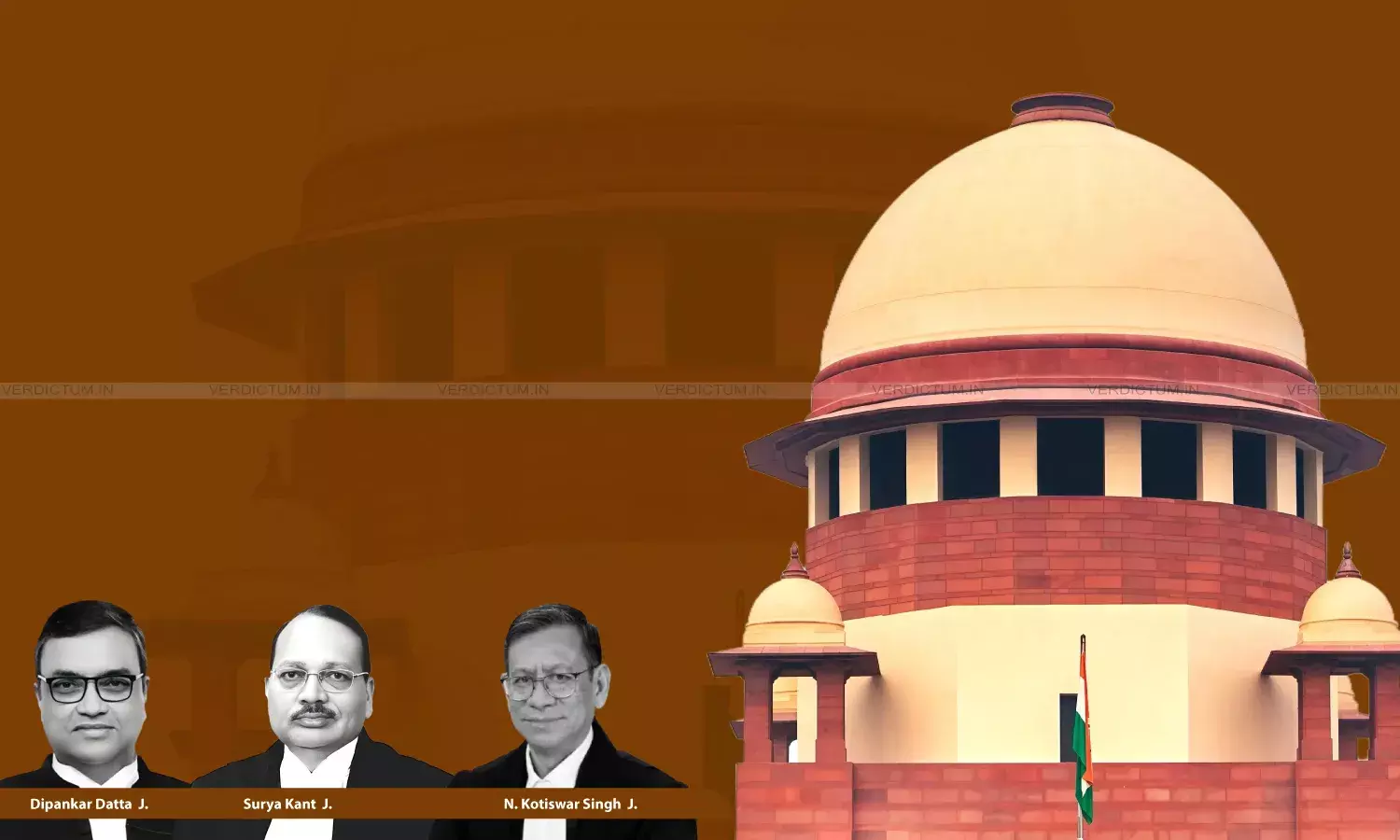Supreme Court: Even After 78 Years Of Independence, Court Remains Engaged In Resolving Controversy Of Land Rights Conferred By Colonial Powers
The Supreme Court said that any critique or disquiet the Bench may express regarding the colonial legacy must nevertheless not be construed as a reflection on the legitimacy of the claims or the rights the Appellants seek to assert.

Justice Surya Kant, Justice Dipankar Datta, Justice N. Kotiswar Singh, Supreme Court
The Supreme Court in a case, remarked that even after 78 years of independence, it remains engaged in resolving controversy arising out of land rights conferred by colonial powers.
The Court was hearing a batch of Civil Appeals preferred against the common Judgment of the Bombay High Court in an issue pertaining to the recission of land grants relating to properties situated in the Union Territory of Dadra and Nagar Haveli.
The three-Judge Bench comprising Justice Surya Kant, Justice Dipankar Datta, and Justice N. Kotiswar Singh observed, “What is perhaps most striking about the instant case is not merely that this Court is called upon to adjudicate a dispute originating over half a century ago, rather, it is the deeper irony that, even after seventy-eight years of independence, this Court remains engaged in resolving a controversy arising out of land rights conferred by colonial powers that once exploited this nation’s wealth and resources. Any critique or disquiet this Bench may express regarding the colonial legacy must nevertheless not be construed as a reflection on the legitimacy of the Appellants’ claims or the rights they seek to assert.”
The Bench said that as the Appellants’ land rights were conferred under the erstwhile Portuguese legal regime, the matter necessitates a nuanced understanding of the scope and import of those legal provisions as they existed a century ago, examined through the lens of Indian legal principles and established jurisprudence.
Senior Advocates Aryama Sundaram, Gopal Subramaniam, and Advocate Shivaji Jadhav appeared for the Appellants while Solicitor General of India Tushar Mehta and Additional Solicitor General of India Aishwarya Bhati appeared for the Respondents.
Court’s Observations
The Supreme Court in view of the above facts, noted, “Under Portuguese law, the contract of ‘emphyteusis’ involved the transfer of beneficial ownership (possessory rights) by the owner of a property to another individual, subject to the latter’s obligation to pay an annual sum—referred to as the ‘emphyteutic’ pension or canon—to the former. This arrangement effectively meant that the Portuguese State, which then possessed eminent domain rights, conferred conditional ownership upon individuals within its administered territories, while retaining the right to receive annual ‘emphyteutic’ payments in recognition of its continuing title to the land.”
The Court said that Government Regulation No. 985, referred to as the Organic Structure of the Lands of Nagar Haveli or the ‘Organizacao Agraria’, was brought into force in 1919 (OA), to regulate the revenue administration of the Portuguese State.
“Article 1 of the OA stipulated that, ‘all immoveable properties situated at Pragana of Nagar Haveli, which do not belong to either collective bodies or individuals would vest in the domain of the State’. Pursuant to this OA, agricultural lands were thus granted on the basis of perpetual lease rights known as ‘Alvaras’ for indefinite periods of time, subject to the payment of a fixed assessment or ‘land revenue’.”, it added.
The Court was of the view that a situation cannot arise where, after such an extended passage of time, the Appellants beckon to return to the drawing board, reappraise evidence long since concluded, and attempt, in effect, to put the proverbial genie back into the bottle.
“Courts ought to curb such fishing/roving inquiries on the mere asking of a party. … After all, the law assists only the wakeful and not those who sleep on their rights: vigilantibus non dormientibus jura subveniunt”, it added.
The Court further noted that the principle of lex specialis derogat legi generali (a specific law overrides a general law) becomes immediately applicable, namely where a special enactment has been framed to deal with a defined subject matter, its provisions must prevail over those of the general law to the extent of any overlap.
The Court said that the High Court is correct in holding that the inference drawn by the First Appellate Court pertaining to long inaction by the authorities amounting to abandonment of the right is untenable in law.
“Acquiescence cannot be presumed solely on the basis of delay, and no such conclusion can be sustained without clear and unequivocal conduct amounting to voluntary relinquishment”, it enunciated.
Hence, the Court remarked that the assertions advanced by the Appellants on the grounds of waiver and acquiescence stand devoid of merit and are accordingly liable to fall.
“… the decision of the Overseas Council of Lisbon cannot serve as a sheet anchor to advance the plea of waiver or postulate that recission could only be carried out within seven years from the date of grant. Given its own findings, its ratio does not bind the Indian Courts, nor is it directly applicable to the facts of the instant case. In any event, such decisions carry mere persuasive value only. The plea founded on the concept of reasonable time is therefore also rejected”, it also said.
Conclusion
Moreover, the Court noted that Doctrine of Repeal and Savings of a Statute, within the confines of Indian jurisprudence, is primarily governed by Section 6 of the General Clauses Act, 1897.
The Court observed that the governing law for determining the nature and extent of the rights in the lands granted to the Appellants is the OA, and the inquiry must be confined to its provisions.
“… we hold that the findings of the High Court in the Impugned Judgment suffer from no infirmity, legal or factual, warranting interference under our appellate jurisdiction”, it concluded.
Accordingly, the Apex Court dismissed the Appeals.
Cause Title- Divyagnakumari Harisinh Parmar and Others v. Union of India and Others (Neutral Citation: 2025 INSC 1145)


